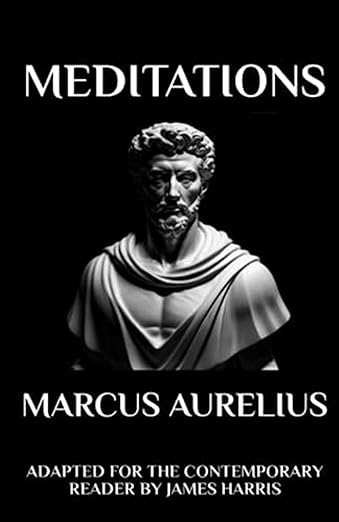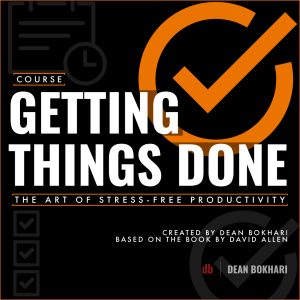About
After watching Gladiator II recently, I couldn’t help but notice all the references to my journal-loving homeboy, Marcus Aurelius. This led me to revisit my old copy of Meditations, which brings us to this summary. Meditations by Marcus Aurelius is a series of writings on Stoic philosophy—written by the former Emperor of Rome. Fun fact for you: Aurelius never intended to publish any of these writings, because he was writing them as notes to himself. In these writings, Aurelius shares his ideas on a wide array of personal development principles, including the power of integrity, the pros and cons of love, insights on harnessing your focus, and tons of other knowledge bombs pulled from the Stoic way of life.
Summary-in-a-Sentence
Don’t get caught up in trivial matters, let go of pettiness, and appreciate your life within a larger context.
Crucial Quotes
from Meditations by Marcus Aurelius
“You have power over your mind—not outside events. Realize this, and you will find strength.”
“The things you think about determine the quality of your mind. Your soul takes on the color of your thoughts.”
“It is not death that a man should fear, but he should fear never beginning to live.”
1.
Choose not to be harmed.
“Choose not to be harmed—and you won’t feel harmed. Don’t feel harmed—and you haven’t been.”
— Marcus Aurelius, Meditations
Marcus Aurelius Antoninus was emperor of Rome from 161AD until his death 19 years later. By the time he came to power, Rome was under threat: constantly at war, plagued with disease, and to make matters worse, they had to deal with earthquakes, too.
As leader of Rome, Aurelius remained calm and conscientious throughout each of these challenges—helping his people persevere.
Try to imagine the leader of any of today’s developed countries being so calm and philosophical in the midst of such crises. For these reasons, Marcus Aurelius was adored by the Romans even after his death—leaving a lasting legacy that framed him as the perfect emperor. He wasn’t perfect of course, but who is? Near the end of his reign, Aurelius was hailed as a genuine philosopher-king who provided the last real nobility of rule—until his corrupt son Commodus took over the throne and F’d it all up.
As a student of Stoic philosophy, Marcus Aurelius refused to be made miserable by the difficulties of life:
“Begin each day by telling yourself: Today I shall be meeting with interference, ingratitude, insolence, disloyalty, ill-will, and selfishness – all of them due to the offenders’ ignorance of what is good or evil. But for my part I have long perceived the nature of good and its nobility, the nature of evil and its meanness, and also the nature of the culprit himself, who is my brother (not in the physical sense, but as a fellow creature similarly endowed with reason and a share of the divine); therefore none of those things can injure me, for nobody can implicate me in what is degrading. Neither can I be angry with my brother or fall foul of him; for he and I were born to work together, like a man’s two hands, feet or eyelids, or the upper and lower rows of his teeth. To obstruct each other is against Nature’s law – and what is irritation or aversion but a form of obstruction.”
2.
Abide by the law of the universe.
Stoicism is a Greek school of thought that originates from around about 300BC. The essence of the Stoic philosophy is that we should submit to the law of the universe in order to live well.
Stoic philosophy was BIG on values like:
- integrity
- duty
- delayed gratification
- avoiding hedonistic pleasure
- practicing reason
- putting the greater good before their own
- the fearlessness of death
- taking responsibility over our actions
- free-thought, independent thinking
Marcus Aurelius would have approved of the United Nations and other global organizations that stand for collaborative effort.
The Stoics, in fact, had an international outlook and believed in universal brotherhood.
Stoic passages are powerful enough to endure the test of time, still applicable today:
“All things fade into the storied past, and in a little while are shrouded in oblivion. Even to men whose lives were a blaze of glory this comes to pass; as to the rest, the breath is hardly out of them before, in Homer’s words, they are ‘lost to sight alike and hearsay’. What, after all, is immortal fame? An empty, hollow thing. To what, then, must we aspire? This, and this alone: the just thought, the unselfish act, the tongue that utters no falsehood, the temper that greets each passing event as something pre-destined, expected, and emanating from the One source and origin.”
— Marcus Aurelius, Meditations
That was written over 19 centuries ago, but it’s somehow even MORE relevant today—especially when we know how long ago it was written.
Marcus Aurelius’ life itself bears the statement out; not many now will have cause to remember his skill or otherwise as a leader, but his Meditations—his deepest thoughts on life and living continue to endure.
3.
Everything has a purpose.
“Everything—a horse, a vine—is created for some duty. This is nothing to wonder at: even the sun-god himself will tell you, ‘This is a work I am here to do,’ and so will all the other sky-dwellers. For what task, then, were you yourself created? For pleasure? Can such a thought be tolerated?”
— Marcus Aurelius, Meditations
So.. what’s your purpose?
What are you here to do?
And are you doing it right now? If not, why not?
If you don’t know what your purpose is, it might be worth it to set aside some time to think about it.
4.
Seek synergy.
Aurelius’ Meditations are packed with pearls of wisdom on the basic unity of all things in the universe—including people.
He advises us to empathize with others—to see through another person’s eyes—because doing so expands our own worldview and helps us look for unity over division.
Aurelius believed that judging, despising, or oppressing people was in opposition to the natural laws of the universe. In order to move the world forward, it’s essential to shift this mindset to a more positive, cooperative, collaborative mindset—one in which we co-exist with others.
Every page of Meditations is like a subtle push to accept circumstances and people as they are—not how we would like them to be.
5.
Focus.
“Concentrate every minute like a Roman—like a man—on doing what’s in front of you with precise and genuine seriousness, tenderly, willingly, with justice. And on freeing yourself from all other distractions. Yes, you can—if you do everything as if it were the last thing you were doing in your life, and stop being aimless, stop letting your emotions override what your mind tells you, stop being hypocritical, self-centered, irritable.”
— Marcus Aurelius, Meditations
The beauty of Stoicism is its ability to put things in perspective — so that you can remember what really matters in life.
When it comes to focus: Clear away the distractions and concentrate fully on one thing at a time. Develop the Next Action habit.
Here’s another gem from Aurelius to keep you focused and on-task:
“At dawn, when you have trouble getting out of bed, tell yourself: “I have to go to work — as a human being. What do I have to complain of, if I’m going to do what I was born for — the things I was brought into the world to do? Or is this what I was created for? To huddle under the blankets and stay warm?”
So you were born to feel “nice”? Instead of doing things and experiencing them? Don’t you see the plants, the birds, the ants and spiders and bees going about their individual tasks, putting the world in order, as best they can? And you’re not willing to do your job as a human being? Why aren’t you running to do what your nature demands?
You don’t love yourself enough. Or you’d love your nature too, and what it demands of you.”
6.
Don’t lose perspective.
“It is, in other words, not objects and events but the interpretations we place on them that are the problem. Our duty is therefore to exercise stringent control over the faculty of perception, with the aim of protecting our mind from error.”
— Marcus Aurelius, Meditations
Imagine you’re on your way to an important meeting. You’re cruising down the highway as usual, on pace to get there a few minutes early.
But then you hit some unexpected traffic.
Crap. You realize it’s because an accident occurred a few miles ahead.
And now you might be late.
How do you handle it?
You freak out and start fuming. “What a disaster,” you think to yourself, “Now I’ll be late, and everyone’s going to think I’m unprofessional. The whole day is ruined!” Your heart starts racing. You get super anxious. And by the time you get to your meeting, you’re in a terrible mood.
Your negative interpretation of the traffic caused you to start stressing out, even though the traffic itself was outside your control.
What if you handled it differently?
Let’s run it back…
You hit traffic. Instead of fuming, you say to yourself, “I can’t control the traffic, but I can control how I respond. I’ll use this time to mentally prepare + practice for the meeting, or maybe catch up on a podcast.” Then, you take a few deep breaths and remain calm. Before you know it, the traffic clears up. You make it to the meeting feeling positive, confident, and ready to engage.
One scenario. Two perspectives.
The traffic jam isn’t responsible for your emotional well-being—you are.
It’s not the event that causes the problem—it’s how we choose to perceive it.
7.
See the world as it really is (but remember to marvel at its awesomeness, too.)
The person who can see the world as it really is also carries the ability to see beyond that world. We are here and we have a job to do, but there is a feeling that we came from another place, and will eventually go back to it.
Life can be sad and lonely, seemingly one thing after another, but this should never dull our basic wonder at our existence in the universe:
“Survey the circling stars, as though you yourself were mid-course with them. Often picture the changing and rechanging dance of the elements. Visions of this kind purge away the dross of our earth-bound life.”
Closing notes
Meditations is not just another self-help book with simple solutions—it’s actually about the imperfect nature of the human experience and how best to deal with it. We don’t always know why certain things happen, or why people behave the way they do, but it’s not up to us to judge anyone anyway—there’s a larger meaning to it all that we don’t always understand… And knowing that—being aware of that—is comforting in and of itself.
About the author:
- Marcus Aurelius – When Hadrian, one of Rome’s most successful emperors, died in 138AD, he appointed as his successor Antoninus Pius, who in turn, on Hadrian’s instructions, adopted the 17-year-old Marcus Aurelius as his successor. The young man’s future was confirmed when he was married to Faustina, a daughter of Antoninus Pius. As well as carrying out courtly duties, he devoted himself to the study of law and philosophy. Taking power at age 40, Aurelius voluntarily divided rule with his brother Lucius Verus, who was to die eight years later. Though peaceful by nature, Aurelius was forced continually to defend the Empire’s territories against the Germanic tribes, including the Marcomanni and the Quadi. A single manuscript, now lost, is the source of the Meditations. Marcus Aurelius had never intended that it be published. The year 1559 saw its first printing, almost 14 centuries after the emperor’s death in 180. While Ridley Scott’s film Gladiator portrays the emperor being murdered by Commodus, there is no historical evidence for this.
Bonus quotes
Here’s a categorized list of my personal favorite quotes from Meditations by Marcus Aurelius.
Marcus Aurelius’ Quotes on
Self-criticism + not caring what people think:
“Begin each day by telling yourself: Today I shall be meeting with interference, ingratitude, insolence, disloyalty, ill-will and selfishness—all of them due to the offenders’ ignorance of what is good or evil. But for my part I have long perceived the nature of good and its nobility, the nature of evil and its meanness, and also the nature of the culprit himself, who is my brother (not in the physical sense, but as a fellow-creature similarly endowed with reason and a share of the divine); therefore none of those things can injure me, for nobody can implicate me in what is degrading.” — Marcus Aurelius, Meditations
(☝️ One of my all-time favorite quotes.)
“Everything we hear is an opinion, not a fact. Everything we see is a perspective, not the truth.” — Marcus Aurelius, Meditations
“I have often wondered how it is that every man loves himself more than all the rest of men, but yet sets less value on his own opinion of himself than on the opinion of others.” — Marcus Aurelius, Meditations
“Whenever you are about to find fault with someone, ask yourself the following question: What fault of mine most nearly resembles the one I am about to criticize?” — Marcus Aurelius, Meditations
“When another blames you or hates you, or people voice similar criticisms, go to their souls, penetrate inside and see what sort of people they are. You will realize that there is no need to be racked with anxiety that they should hold any particular opinion about you.” — Marcus Aurelius, Meditations
Marcus Aurelius’ Quotes on
life, personal development, + positive thinking:
“You have power over your mind – not outside events. Realize this, and you will find strength.” — Marcus Aurelius, Meditations
“Forget everything else. Keep hold of this alone and remember it: Each of us lives only now, this brief instant. The rest has been lived already, or is impossible to see.” — Marcus Aurelius, Meditations
“Our life is what our thoughts make it.” — Marcus Aurelius, Meditations
“When you arise in the morning think of what a privilege it is to be alive, to think, to enjoy, to love …” — Marcus Aurelius, Meditations
“The object of life is not to be on the side of the majority, but to escape finding oneself in the ranks of the insane.” — Marcus Aurelius, Meditations
“The happiness of your life depends upon the quality of your thoughts.” — Marcus Aurelius, Meditations
“Dwell on the beauty of life. Watch the stars, and see yourself running with them.” — Marcus Aurelius, Meditations
“Love nothing but that which comes to you woven in the pattern of your destiny. For what could more aptly fit your needs?” — Marcus Aurelius, Meditations
Marcus Aurelius’ Quotes on
leadership:
“Waste no more time arguing about what a good man should be. Be one.” — Marcus Aurelius, Meditations
“The best revenge is to be unlike him who performed the injury.” — Marcus Aurelius, Meditations
“If someone is able to show me that what I think or do is not right, I will happily change, for I seek the truth, by which no one was ever truly harmed. It is the person who continues in his self-deception and ignorance who is harmed.” — Marcus Aurelius, Meditations
Marcus Aurelius’ Quotes on
overcoming anxiety + stress:
“Never let the future disturb you. You will meet it, if you have to, with the same weapons of reason which today arm you against the present.” — Marcus Aurelius, Meditations
“If you are distressed by anything external, the pain is not due to the thing itself, but to your estimate of it; and this you have the power to revoke at any moment.” — Marcus Aurelius, Meditations



